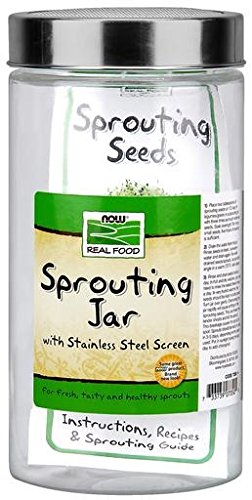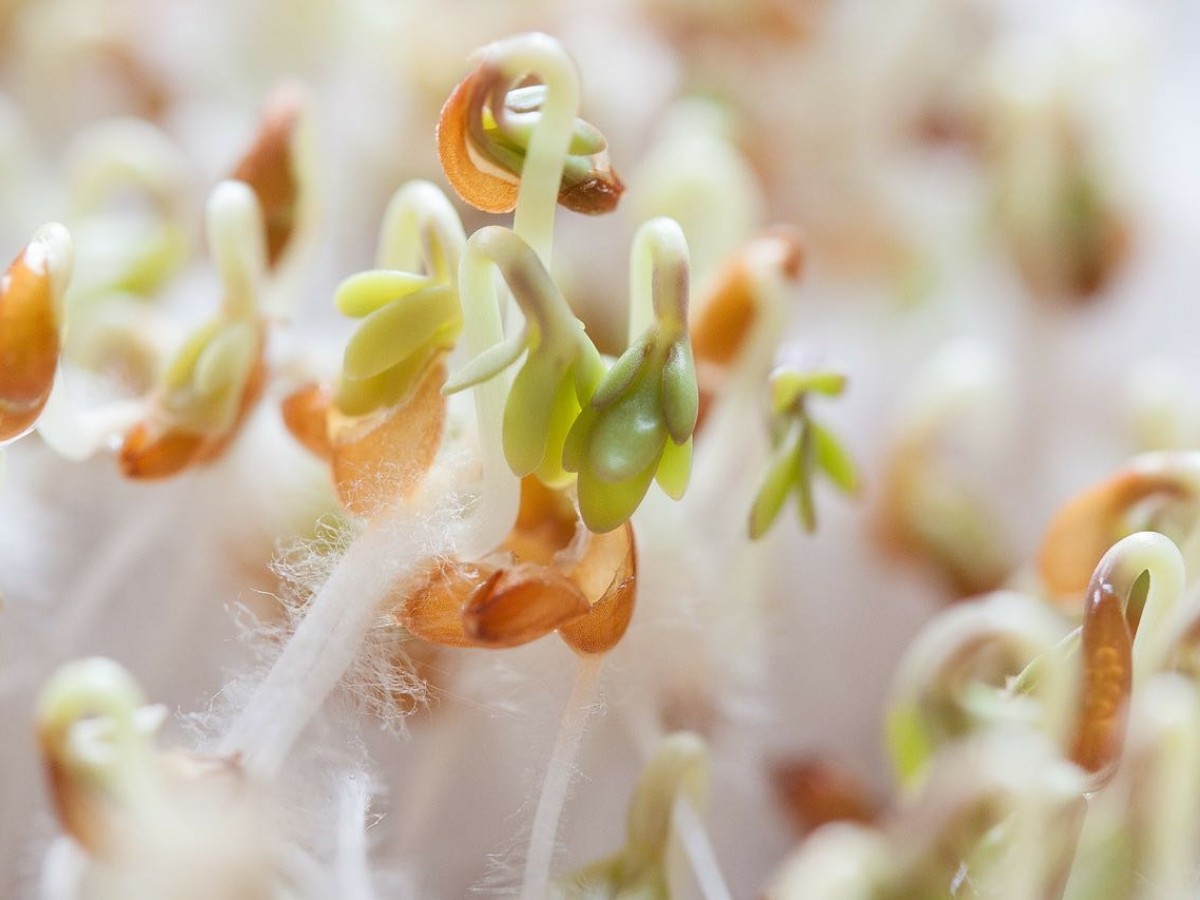No Hassle Sprouting for People Who Can’t Grow Stuff.
All or nothing invariably leads to nothing. —Dani Shapiro
A friend of mine once said he always wanted to plant a garden, but was afraid to, because in his experience, he "kills things”. So it became the garden that never was.
It’s true; one of the best ways to decrease your dependence on industrialized food is to grow your own food. But gardening isn’t always easy. I can sympathize with the garden that never was. Where I live, at 3,000 feet, it’s hard to garden year round, unless you want to grow and consume pinecones. And bringing the garden indoors has its own set of challenges; I once had a whole tray of sunflower microgreens go moldy on me the day before harvest—that wasn’t disappointing or anything.
So I've tried to develop a more philosophical attitude towards gardening over time, something other than the all-or-nothing, go-big-or-go-home mantra that has, so far, confined me to a rather small corner in life.
Luckily, one of the best ways to grow your own food is also one of the easiest: just start sprouting things—on the countertop, by the sink, on the window sill, wherever. No soil necessary. No vagaries of calendar, compost, or cognition. Welcome to the great indoors. Welcome to immediate gratification and proximity. Sprouts can be grown right next to where you cook. Just pluck and serve.
Seeds of Greatness.
"It is the nature of all greatness not to be exact," said Edmund Burke, one of the few Brits in Parliament in the 1770's, who supported the American revolution. How true. The American revolution was great. And not exact. Which is why every four years or so, we get to figure it all out again, I suppose.
What's true for political revolutions is also true for scientific revolutions. They are great and not exact; they are self-critical and evolving. That's science. For example, we don’t know exactly how plants go about healing us, but that doesn't make plants any less great at their job. We think we know a few things and we want to know more.
So, let's take a look at a few of the plants—the sprouts—that I grow on my own countertop, as well as some of their probable health benefits:
-
Mung Bean Sprouts:
- Mung beans are a wonderful source of protein. They contain a complete amino acid profile, including histidine, aspartic acid, and isoleucine.
- They are a great source of Vitamin A precursors, as well as a variety of rare B Vitamins like B1, B2, B3, B6.
- Mung bean sprouts are low glycemic, making them ideal for diabetics (and for anyone else on the blood sugar roller coaster, which is most of us).
- And mung beans sprouts may kill cancer cells. This is speculative, of course, but interesting. Sprouted mung beans contain high levels of Amygdalin (a.k.a. laetrile, or "vitamin B17"), which may arrest tumor growth. So how would Amygdalin kill cancer cells without killing healthy cells? Well, the current theory is that healthy cells contain an enzyme called rhodanese, which deactivates the cyanide molecule found in Amygdalin, rendering it harmless. But cancer cells lack rhodanese and so the Amygdalin is potentially toxic to them. Not only that, cancer cells often express another enzyme called beta-glucosidase, which actually helps free the cyanide, curiously assisting the cancer cell to commit suicide—like some Nazi thug crushing a vile of cyanide between his teeth, just before you can shake him by his leather lapels and get critical information out of him. Heil Hydra.
- Sprouted mung beans are of course no magical cure for cancer. If anything, they are probably more like a cheap preventative measure. Also, keep in mind that more is not always better. Toxicity studies still need to be done on Amygdalin. It stands to reason that you could possibly overwhelm your protective rhodanese by eating too much of it. A small handful of mung bean sprouts daily is probably plenty.
- Serving suggestions: I blend a few mung bean sprouts into my Vitamix smoothie. I add them to salads. I eat them over rice.
-
Broccoli Sprouts:
- Broccoli sprouts are a star. I've discussed the detoxification and anti-cancer benefits of glucosinolates in broccoli at length in my post Why Green Looks Good on You. Glucosinolates contain a lot of sulfur. And the liver needs plenty of sulfur to eliminate toxins.
- When you chew Broccoli sprouts, glucosinolates break down into indole-3-carbinol and sulforaphane. These compounds not only help the body eliminate toxins, they help it eliminate excess estrogen as well. This makes women who consume large amounts of cruciferous veggies (like broccoli sprouts) less likely to develop estrogen-sensitive breast cancers, uterine cancers, or cervical cancers. And for men, there may be some advantages to clearing estrogen as well, because that frees up testosterone to do its job. Yo!
- We are currently swimming in a sea of xenoestrogens (man-made estrogen-like compounds), produced from the environmental breakdown of PCBs (polychlorinated biphenyls). PCBs become more estrogenic as they degrade, losing their chlorine molecules, so even though PCBs have been outlawed for years, they are becoming more potent in the environment over time. That—combined with hormone-treated meat and dairy and other man-made estrogen sources—means we have an unprecedented situation in which estrogen detoxification is becoming an issue for both women and men. So eat your broccoli and broccoli sprouts.
-
Radish sprouts:
- Radish sprouts, like broccoli sprouts, are also cruciferous veggies with loads of glucosinolates, so they too help with detoxification and hormone balance.
- Radish sprouts are good sources of Vitamins A, B, C, E and K. They are a good source of minerals: Calcium, Iron, Magnesium, Phosphorus, Potassium, and Zinc. And they are a good source of phytonutrients: Carotene, Chlorophyll, and of course Glucosinolates.
-
Green Lentil Sprouts:
- Sprouted Lentils are a good source of Thiamin, Iron, Phosphorus and Copper, Vitamin C, Folate, Manganese, and Zinc.
- Every time you ejaculate you lose a little Zinc. Men, are you listening? It takes Zinc to make semen and it takes Zinc to maintain testosterone levels. So a good sex life can wind up depleting you of the very thing you need for a good sex life—Zinc—unless you're eating it as regularly as you...
- Zinc is also particularly important for your sense of taste and smell. And of course, it can give your immune system a nice upgrade. Ever heard of Zinc lozenges for a cold?
- And then there's Manganese, which helps control your blood sugar and promote brain function, among many other things.
- And Copper is key, because it activates cytochrome c oxidase, a protein in your mitochondria used to make energy. It also helps produce the pigment melanin, so you can get a suntan instead of a sunburn.
- Folate is my all-time favorite player here, because it helps you make S-adenosylmethionine: a chemical your cells use to control gene activity. The ability to turn genes on and off, as needed, is important because gene dysregulation contributes to cancer growth.
- Folate also plays a key role in fetal development, which most of us know from the prenatal vitamin industry. But what might be news to us is this: we have recently discovered that Folate has a lynchpin role to play in maintaining mental health. Depression, Bipolar, and Schizophrenia have all been linked now to variations in human folate metabolism. So whatever else you do, not to feel blue, eat more greens. Or sprouted green lentils, in this case.
- And if you're still not inspired to make a salad, consider this: Whole-food-derived Folate is vastly superior to the synthetic Folic Acid you find in vitamin supplements and fortified foods, because synthetic Folic Acid requires a slow and inefficient enzyme to convert it into something your body can use (much of it remains uncoverted). Whole-food-derived Folate has already undergone this first enzymatic conversion step; it's ready to go to work and be a contributing member of your metabolism. I'm reminded of the old 1970's margarine commercial, the one with that green goddess out in the forest wailing, "It's not nice to fool mother nature!" Looks like that goes for Folate now too (not just butter). You want the real thing. There may be genetic reasons for you to supplement Folate, but in that case you definately don't want synthetic Folic Acid; you want methylfolate, the end-product of a long chain of folate conversions that are compromised in some people. Learn more in my post, Why Green Looks Good on You.
-
Alfalfa Sprouts:
- How could I skip alfalfa sprouts? They are the quintessential counter-top collection we always think of when we think of sprouts.
- Alfalfa sprouts are a good source of vitamin K, vitamin C, and once again our friend Folate. Other less-prominent vitamins in alfalfa sprouts include vitamin A, thiamin, riboflavin, niacin, vitamin B6 and panthothenic acid.
- A word of caution about alfalfa: this seed has fairly high levels of an amino acid called canavanine. There are some studies showing an association between canavanine and flare ups of inflammatory conditions, like rheumatoid arthritis and systemic lupus erythematosus. So if you have a chronic inflammatory condition, or autoimmune disorder, you may want to choose another sprout for your turkey sandwich.
Getting Your Hands Wet.
Okay. It's time to sprout stuff.
First, I’m not MacGyver, so I'm not going to show you how to build your own sprout jar with some stainless steel and a blowtorch. Are you relieved? I thought so. If you're like me, you just want something that works every time, right out of the box. Right? So I'll tell you what I use: the Now Foods Sprouting Jar with Stainless Steel Screen.

This is probably the one jar to rule them all. Really, you just add water. You rinse it twice a day (once when you get up and once when you go to bed) and then you're done. In three days you can start munching.
I used to use a complex stack of plastic trays to sprout things; it was like a kitschy version of the hanging gardens. But they never became one of the 7 wonders of the world. On the contrary, my gardens were more like bogs: soggy, stinky, and moldy. When I switched to a large-diameter glass jar with good air-flow and venting, the sprouts sprang to life; now, they are always crisp and delicious. In fact, I think I'm going to get a second jar, so I can stagger my harvests and always have one going. I haven’t had any problems with the lid sticking on the Now Foods jar, as some people have reported. So check it out.
And if you need some seeds, but you don't want to mess around trying to cobble together a mix of your own, try the Handy Pantry 5-Part Organic Salad Sprout Seed Mix. It contains the same five sprouts we've just discussed: Radish, Broccoli, Alfalfa, Green Lentil & Mung Bean. I've got some growing right now, next to my Vitamix.
One final piece of advice: use filtered water to grow your sprouts. Municipal water supplies often have too much chemical residue for your sprouts to really flourish. (And if that's true, you probably want to be drinking filtered water yourself.)
With that, I'll leave you with another quote from Edmund Burke—the man who just might have believed in the do-it-yourself moxie of Americans more than we do.
No one could make a greater mistake than he who did nothing because he could do only a little.
Sprout a little. Live a lot.
Yours in Health and Resilience,
Marc Wagner, MD, MPH, NTP.
